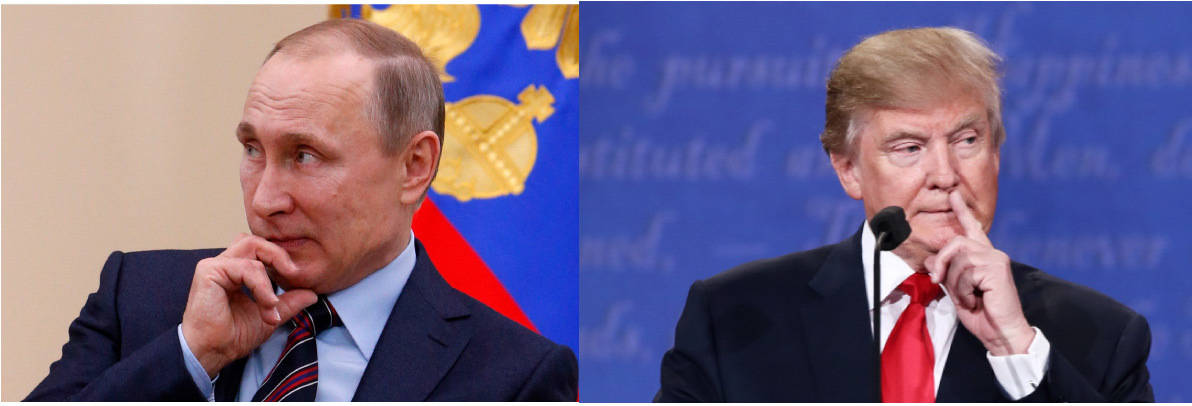Opinion, Politics
Trump’s Syrian Airstrike: False Flag or Diversion?

Trump’s Syrian airstrike and the further deterioration of U.S.-Russian relations has made the investigations by Senate and Congressional committees even more confusing and complicated.
Some, like the President’s son Eric Trump, have said that the airstrikes prove that there has been no collusion or coordination between the Russian government and his father’s administration during the election.
This reaction seems logical when taken with the face value knowledge that Bashar al-Assad’s army (who was reportedly responsible for the chemical attack) is working closely with Russia in putting down the civil war that’s been raging for over six years.
However, others on the anti-Trump left and the populist and conspiracy-leaden far right have posited that the chemical attack and the resulting airstrikes were either “false flag operations” or used the same type of coordination between the Russians and Americans as during the election.
These theories are speculative at best, but impossible to avoid for media sources that have focused on hearings and leaks of different people in the Trump administration who were reported to have a shady relationship with Russian officials.
Trump’s Connections To Russia During the Election
First, the connections between Russia, Trump, and the FBI investigation into the Trump Administration is slowly unfolding.
Last summer, the FBI obtained a warrant issued by the Foreign Intelligence Surveillance Court to monitor Trump’s advisor, Carter Page, for being in touch with a Russian agent, according to the Washington Post.
This report adds to connections made public about former National Security Advisor General Michael Flynn, who had to resign from his post after lying to Vice President Mike Pence about meetings with the Russian Ambassador.
Additionally, Attorney General Jeff Sessions had to recuse himself from the Russian investigation for similar meetings, and Former Campaign Chairman Paul Manafort is being investigated for his lobbying for a pro-Putin Ukrainian government.
All of this points to intense speculation that Russian hackers aided in disseminating pro-Trump fake news in the 2016 election, and that the Trump administration coordinated with those hackers, and tipped the election in Trump’s favor.
U.S.-Russia Relations
Secondly, U.S.-Russian relations has publically deteriorated as a result of the Syrian bombing.
On Wednesday, the Secretary of State Rex Tillerson met with Russian Foreign Minister Sergei Lavrov in Moscow, coming amid heightened tensions between the two governments about who is responsible for the Syrian chemical attack.
“The recent chemical weapons attack carried out in Syria was planned and it was executed by Syrian forces, and we are confident of that,” said Tillerson when asked by a reporter from Russia’s state television network.
“This is obviously the subject where our views differ,” Lavrov said sharply in response, adding, “Russia is not seeking to cover up for anyone in the chemical weapon incident.”
The divide between the two countries has drastically worsened to the lowest it has been since the Cold War, with each side pointing fingers at the other and with little room for compromise.
Is There A Connection?
How, then, can Russia both help Trump win the election, and then, less than 6 months later, be America’s enemy number one? The answer, as alluded to before, would necessarily need to be speculative and a complicated one.
On the intensely anti-Trump left, conspiracy and collusion have to twist around narratives to justify the attack. Putin and Trump orchestrated the chemical attack and the following attack as a diversion to get the Russian story out of the headlines.
This line of conspiracy forces a couple uncomfortable scenarios that need to be accepted. That Trump’s administration knew about the impending chemical attack and did nothing. That the resulting Russian outrage at the U.N. and elsewhere is elaborate political theater. And that Trump is willing to brush against a potentially cataclysmic worldwide response to save his own skin.
Depending on how you feel about Trump, these scenarios seem as plausible as Eric Trump’s absolution of the administration’s suspicious dealings with Russian.
On the far-right, sites like Breitbart and Infowars have both speculated, along with Republican Rand Paul and Russia’s Putin, that the chemical attack was a “false flag” perpetrated by Americans to justify more force by America in the Middle East.
Conclusion
As for which seems more plausible, I would argue that the election and the foreign policy can be compartmentalized, and that reading into actions as an indication of policy towards Russia is counter to how to approach a Trump administration.
Trump wanted to win the election by any means necessary. He also wants to appear strong in the face of conflict. Both the election and the Syrian crisis need a different public stance towards Russia. So Trump’s administration shifted appropriately.


